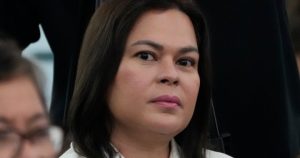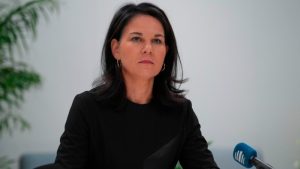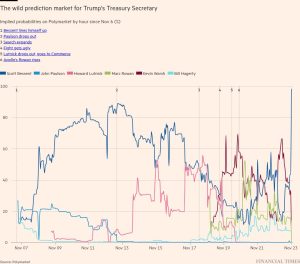Election showdown in Georgia
This article is an onsite version of our Europe Express newsletter. Sign up here to get the newsletter sent straight to your inbox every weekday and Saturday morning. Explore all of our newsletters here
Welcome back. In Tbilisi, which I visited this month, the political mood is ominously tense and polarised. Georgia’s October 26 parliamentary elections are set to be the most consequential for the mountainous south Caucasus country since it emerged in 1991 as an independent state out of the ashes of the Soviet Union.
At first sight, it seems that Georgia faces two possible futures: creeping authoritarianism and alignment with Russia if the ruling Georgian Dream party stays in power, or democracy and a pro-European path if the opposition wins and takes office. However, this black-and-white picture oversimplifies what is an altogether more complicated story. I’m at [email protected].
What is at stake
Since the Kremlin’s full-scale invasion of Ukraine in February 2022, Georgia has turned into a battleground with two fronts: between Georgian Dream and its opponents, and between each side’s respective Russian and western backers.
The levels of political polarisation in Tbilisi are so extreme that, in this election campaign, there hasn’t been a single case of government and opposition representatives debating each other on television, radio or other media. Mutual trust is non-existent.
The opposition has painful memories of the fate of the first independent Georgian state of modern times. This led a precarious existence from 1918 to 1921 before being absorbed into the Soviet Union.
Now the opposition fears that, if Georgian Dream retains power, the nation could fall completely under Russian influence and lose its precious but fragile democracy and civic freedoms.

For the west, such an outcome would be a blow to its interests and credibility. The US and its European allies support Georgia’s independence. The EU has even made the country a candidate for membership, though the process is on hold because of the Georgian Dream government’s democratic backsliding and increasingly pro-Russian sympathies.
Russia’s role in Georgia
For its part, Moscow continues to think of Georgia as part of a rightful sphere of influence in the post-Soviet borderlands that separate Russia from the west. “The Russians have never left Georgia, even mentally,” says one western observer in Tbilisi.
In a short war in 2008, Russia took de facto control of two Georgian regions, Abkhazia and South Ossetia, where it keeps around 10,000 troops and FSB security service personnel. South Ossetia is scarcely an hour’s drive from Tbilisi.

There are no signs of imminent Russian military intervention in Georgia. Still, it is unimaginable that the Kremlin would passively accept an election result that brought a pro-western government to power in Tbilisi.
In this article for the Washington-based Center for a New American Security, Nicholas Lokker and Andrea Kendall-Taylor write:
Georgia now arguably has its most pro-Russian government since its independence in 1991 and, in many cases, [Georgian Dream] is following the Putin playbook in its attempt to weaken Georgia’s democracy. Moscow’s primary goal is to ensure the stability of these pro-Russian forces — in particular, GD founder and de facto leader Bidzina Ivanishvili.
Breakdowns in democracy
However, to portray the election as a straightforward contest between tyranny and freedom, or Russia and the west, is to overlook key features of Georgia’s political trajectory over the past three decades.
In this commentary for the Stockholm Centre for Eastern European Studies, Markus Greisz hits the nail on the head. He identifies three long-term issues that have plagued Georgia since independence:
One issue is the deep political and societal polarisation; another is the tendency of all Georgian governments to turn authoritarian.
A third issue is the seemingly paradoxical simultaneous popular support for both the EU and Georgian Dream, which frustrates western leaders and calls into question whether Georgians actually understand what EU membership would entail.
Since 1991, all governments that started out as protectors of national independence and political freedom have lurched into deeply flawed forms of strongman rule, tainted by corruption and abuse of the rule of law.
This was true of Zviad Gamsakhurdia, Georgia’s first postcommunist president; Eduard Shevardnadze, once admired in the west as Mikhail Gorbachev’s far-sighted Soviet foreign minister; Mikheil Saakashvili, a reformer turned autocrat; and now Ivanishvili.
Weaknesses of the opposition
The legacy of the Saakashvili era is a serious problem for Georgia’s four main opposition parties, as set out in this thread on X by Bidzina Lebanidze, a political scientist.
Both Georgian Dream and the opposition are “detached from the majority of the population, who feel alienated from [the] political process”, Lebanidze writes.
“During their rule, Saakashvili and [his party] alienated a critical mass of the electorate who refuse to vote for them ever again.”
A similar argument appears in this commentary by Beka Chedia for the Center for European Policy Analysis:
The opposition, in addition to fragmentation, has a problem of identification and identity. Voters find it difficult to be clear which small party is part of which alliance and what their promises to voters are.
In Tbilisi, one non-partisan election-watcher told me: “It’s not sufficient to frame the election as a contest between pro-western and pro-Russian forces. In the regions, outside the capital, voters seem to think it’s a kind of Saakashvili vs Ivanishvili contest.
“In other words, the image of Georgian politics as an arena for strongmen persists.”
Slim chance of a free election
Public opinion polls for Georgia’s election need to be treated with caution. However, according to one independent expert, Georgian Dream’s private polling indicates it would struggle to win more than 40 per cent of the vote.
The point is, though, that under the system of proportional representation used for this election, Georgian Dream could win just over half the seats in parliament even with 37 to 38 per cent of the vote.
It would help the ruling party if one or more of the opposition parties failed to surpass the 5 per cent threshold required to win seats in the legislature.
Given Georgian Dream’s influence over the nation’s election commissions, control of the judiciary, vote-buying and intimidation of opposition activists, it is all too easy to see how the party could manipulate the election to secure victory.
Shota Gvineria, a former Georgian ambassador and national security specialist, says:
The regime has systematically used state resources to influence voters by offering benefits such as pardons, early release from prison and amnesty [for fines] in exchange for electoral support …
By placing loyalists in the Central Election Commission and district commissions, manipulating voter lists and tampering with ballots, these tactics have severely undermined the integrity of Georgia’s democratic processes and elections.
Possible outcomes
The list of possible election outcomes ranges from good to nightmarishly bad.
Least likely is a Polish scenario. A year ago, an illiberal, conservative nationalist government in Warsaw lost elections to an opposition led by former premier Donald Tusk. Despite some difficulties, Tusk and his allies were able to take office peacefully.
Such an outcome strikes me as improbable in Georgia. The ruling party shows no inclination to give up power, controls almost all levers of state authority and has the means to fix the election.

At the opposite end of the spectrum is a Belarusian scenario. In 2020, mass protests broke out after Alexander Lukashenko, the dictator in Minsk, claimed victory in what were blatantly fraudulent presidential elections.
Lukashenko’s regime cracked down on the demonstrators, and Belarus today is as deprived of freedom as Vladimir Putin’s Russia.
A third possibility is a Serbian scenario. Elections in Serbia routinely produce victories for President Aleksandar Vučić and his ruling party. They aren’t completely free and fair, but Vučić receives little more than a rap on the knuckles from the west, which perceives some value in maintaining a working relationship with Serbia.
Risk of instability or violence
If Georgian Dream wins the election fraudulently, or loses but refuses to concede defeat, anti-government street protests are likely. The history of postcommunist Georgia offers some clues to what then might or might not transpire.
In 2003, public anger at corruption and a fixed election triggered demonstrations that toppled Shevardnadze, Georgia’s then president.

By stepping down, Shevardnadze ensured the Rose Revolution, as these events came to be known, was mostly peaceful. Could the same thing happen after October 26? I am doubtful. By temperament and motivation (he is a reclusive billionaire who made his fortune in Russia), Ivanishvili is quite different to Shevardnadze. The Kremlin openly supports him.
Ideally, the US and European governments would step in and play a mediating role in the event of a contested election result and power struggle. They did this during Ukraine’s 2014 Maidan revolution.
But Ukraine’s new government and its western friends paid a heavy price for that change of power — Russia’s annexation of Crimea and fomentation of separatist rebellions in Donbas, followed by the 2022 invasion.
The future of Georgia is very much in the balance.
Georgia’s Anaklia deep seaport project may open new routes, but at what cost? An analysis by Tymon Pastucha and Wojciech Wojtasiewicz for the Polish Institute of International Affairs
Tony’s picks of the week
-
Israel’s war in Lebanon may be longer and more grinding than the limited operation that was initially announced, the FT’s James Shotter, Neri Zilber and Andrew England report
-
In his newly published memoirs, Robert Bourgi, a French-Lebanese wheeler-dealer, has spilled the beans about how he helped leaders of former French colonies in Africa to subsidise presidential election candidates in France, the BBC’s Hugh Schofield reports
Recommended newsletters for you
FT Opinion — Insights and judgments from top commentators. Sign up here
Chris Giles on Central Banks — Vital news and views on what central banks are thinking, inflation, interest rates and money. Sign up here
#Election #showdown #Georgia




